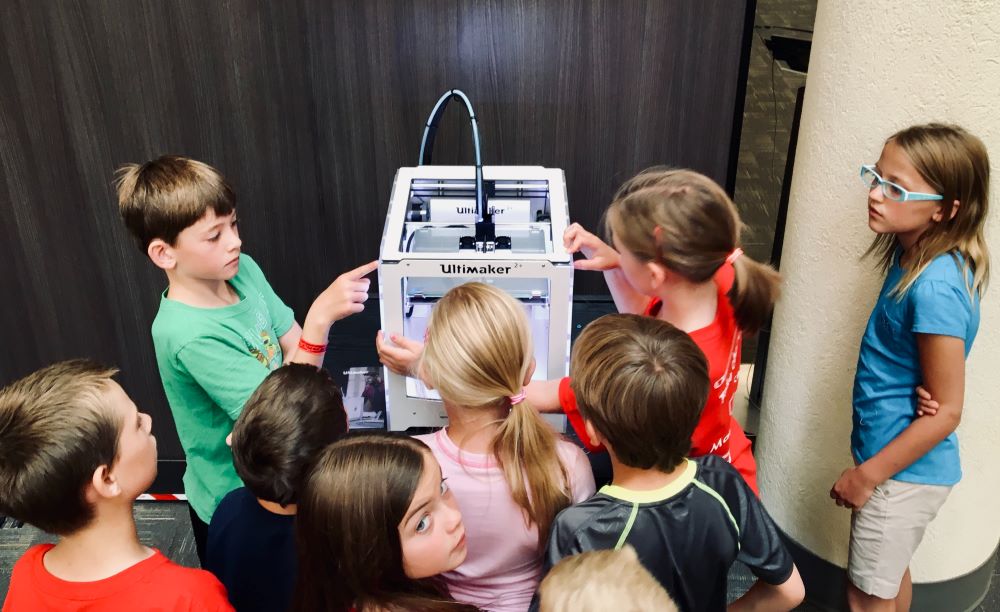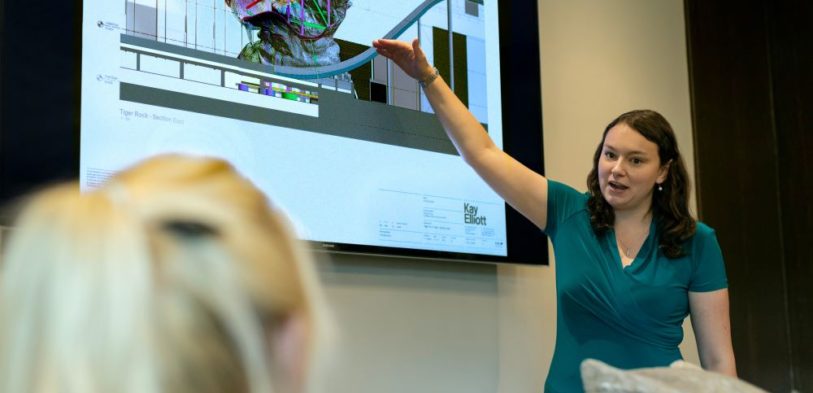How to Become an Educational Technology Specialist (2025)

CONTENTS
- How to become an Educational Technology Specialist (EdTech Specialist)
- What is Educational Technology?
- What is an Educational Technology Specialist (EdTech Specialist)?
- Helpful skills and experience to be an EdTech Specialist
- Salary for EdTech Specialists
- M.Ed in Instructional Technology admission requirements
- Ed.S in Instructional Technology admission requirements
- Most affordable M.Ed online degree programs 2023
- Most affordable Ed.S online degree programs 2023
- Graduate Certificates in Instructional Technology 2023
The Covid-19 pandemic of 2020 created an unprecedented explosion in the field of Educational Technology. The need to ‘Social Distance’ has grown the industry to epic proportions as thousands of schools and universities around the world have transitioned to online learning. Even as COVID-19 becomes less of a public health threat, many schools are finding online classes to be a cheaper and more flexible way to educate their students. Numerous universities have permanently transitioned their degree programs to a 100% online format and many more will follow suit in the near future.
As this trend continues, 2025 is shaping up to be a fantastic year to pursue a career as an Educational Technology Specialist (“EdTech Specialist” for short). In this article, we dive deep into the emerging new world of Educational Technology. You’ll learn why and how to become an Educational Technology Specialist, how the industry is evolving, and how to gain admission into top online degree programs. There’s a lot to cover so let’s jump right in!
What is Educational Technology?

Readers over the age of 30 can recall a time when “educational technology” was simply the overhead projector your teacher set up at the back of the classroom for note taking. But today, the world of education technology encompasses one of the fastest growing technology sectors on the market.
How fast?
Even the U.S. Government has taken a significant interest in the industry of Educational Technology, allocating billions of dollars to fund its development.
In 2017 the U.S Department of Education created the Office of Educational Technology (OET) which put forth the first ever ‘National Education Technology Plan’ (NETP). The goal of the NETP was to articulate “a vision of equity, active use, and collaborative leadership to make everywhere, all-the-time learning possible.” Since then, the U.S Department of Education has received $30.75 Billion for remote learning through the CARES Act. And in 2021, the OET published an update to its flagship NETP which includes a plan for reimagining the role of technology in Higher Education.
But it’s not only the U.S Government who wants a piece of the eLearning pie. Many of the world’s largest private corporations have committed to leveraging the power of technology to transform education and innovate student learning. Take for example technology powerhouse Apple Inc., which pledged $100 Million toward teaching and learning tech solutions as part of their 2014 ConnectedEd Initiative.
So what exactly is this hot new emerging sector that has the federal government and some of the largest corporations chomping at the bit to invest?
What is Educational Technology? Educational Technology encompasses many areas and is expanding rapidly everyday. Essentially, Educational Technology is anything directly or indirectly related to the use of technology in an academic setting. This includes but isn’t limited to the development, implementation, training and maintenance of software, online tools, devices, computers and networks for educational purposes. That’s quite a mouthful. But don’t worry. This will become clearer in the next section when we break down the specific job duties covered by EdTech Specialists.
What is an Educational Technology Specialist (EdTech Specialist)?

An Educational Technology Specialist is an expert who facilitates the integration and maintenance of technologies, such as e-learning software, tablets and laptops, into an academic setting.
Transitioning into online learning is a lengthy, complex task that requires an Educational Technology Specialist at every step of the process. EdTech Specialists create new ways to employ tech in the classroom. They train teachers and students to use new software tools. They also serve as IT support for a schools’ existing technology landscape.
Let’s take a detailed look at each of the job roles and settings EdTech Specialists function in.
Job Settings for EdTech Specialists
Almost every academic setting you can think of needs an Educational Technology Specialist, including: daycare & pre-K, private and public elementary, middle and high schools, charter schools, colleges & universities, nonprofit organizations, private companies and governmental agencies.
In elementary and high school settings, EdTech Specialists often work on-site to help students and teachers with day-to-day usage of classroom technologies and offer support when technical issues arise.
Colleges & Universities are increasingly hiring EdTech Specialists to help design or improve their online curriculum delivery platforms.
Private companies often employ EdTech Specialists to create and manage online employee training materials.
Nonprofits and governmental agencies rely on EdTech Specialists to assist in the formation of education technology policy and digital public service announcements and community resources.

Job Roles for EdTech Specialists
-
Developer
Educational Technology Specialists with expertise in coding and programming can find work as a developer. In this role, an EdTech Specialist helps EdTech companies create world-class eLearning products. As a developer you will be responsible for the design, prototyping, user research and testing of new distance learning products.
-
Consultant
EdTech Specialists play a critical role in identifying suitable education technology for a variety of classroom applications, including English as a Second Language (ESL) and special needs learning. EdTech Specialists working in the capacity of a consultant regularly liaise with educators and administrators to source and design new technologies for online and in-person instruction. They also analyze a school or agency’s current technology-based programs to detect flaws and recommend enhancements.
-
Instructor
After a new technology is introduced into a school or agency’s operation, students, educators, administrators and employees need to learn how to use it. This is where an EdTech Specialist steps in – to provide user training and troubleshooting tips for new technologies. In addition to in-person training sessions, an Educational Technology Specialist is tasked with creating instructional videos and other instructional content.
-
IT Support
Educational Technology Specialists who have an Information Technology (IT) background often fill the role of IT support. As the landscape of education technology rapidly evolves, EdTech Specialists are needed more than ever to guide students and educators through unexpected technical failures.

Alternative Job Titles
Educational Technology Specialist or EdTech Specialist is the most commonly used title for this career. But you may also see it referred to as any of the following:
- Instructional Technology Specialist
- Instructional Coordinator
- Instructional Technologist
- Education Design Specialist
- Learning Development Specialist
Helpful Skills & Experience for Educational Technology Specialists (EdTech Specialists)
Technological Savvy – The ability to navigate a full range of devices (desktops, laptops, mobile) and EdTech software platforms and also troubleshoot when issues arise.
Data Analysis – The ability to collect, review and make sense of raw data to identify problems and/or provide solutions.
Research & Planning – The ability to find and organize information to increase the understanding of a topic and advocate for future next steps.
Problem Solving – The ability to use logical or creative methods to come up with solutions to complex issues.
Leadership – The ability to inspire and mobilize teams and groups of people to form a consensus around a plan and follow through to achieve a set of goals.
Public Speaking – The ability to speak in front of audiences in order to persuade or communicate ideas effectively.
Organization – The ability to collect and store information, files and equipment in an orderly, methodical manner.
Salary and Job Outlook for Educational Technology Specialists (EdTech Specialists)

In the Bureau of Labor Statistics (BLS) database of salary information, “Educational Technology Specialist” is referred to as one of its alternative titles – “Instructional Coordinator”. According to the BLS, Instructional Coordinators earned a median salary of $66,970 per year and $32.20 per hour in 2020. This places the salary for Instructional Coordinators above the national average. The job outlook for Instructional Coordinators is very promising with new job openings expected to grow by 10% through 2030. A job in educational technology is perfect if you value job security and longevity in your career. Even as the economy trends toward technological automation, there will always be a need for specialists who have a solid command of new technologies and can train others to use them.
How to Become an Educational Technology Specialist (EdTech Specialist)
How To Become an Educational Technologist: Step-by-Step
- Obtain a Bachelor’s degree
- Obtain a Master of Education (M.Ed.) degree
- Obtain a Teaching License or Certification (required by some but not all states)
The first thing we should note is that each state has their own set of educational and licensing requirements to become an Educational Technology Specialist. Having said that, there are several shared requirements that every prospective EdTech Specialist needs no matter where they live.
Every state requires Educational Technology Specialists to hold a master’s degree in an Education-related field to become licensed. The most common degree held by EdTech Specialists is a Master of Education (M.Ed). Many schools offer degree programs specifically designed to prepare students for a career in Education Technology, such as: M.Ed. in Instructional Technology, M.Ed. in Applied Technology, M.Ed. in Learning & Technology, and Master of Science (M.S.) in Educational Technology.
Students who have a master’s degree in a non-education field can fulfill the education requirements in one of two ways: 1) enroll in one of the M.Ed. or M.S. programs listed above; or 2) obtain an Education Specialist (Ed.S.) in Instructional Technology degree. The Ed.S. is an advanced degree for post-master’s students and takes less time to complete compared to a typical M.Ed. degree program.
In addition to an M.Ed. or Ed.S. degree, some states require Edtech Specialists to obtain a teaching licensure or certification. You should reach out to the education department in your state to see if your desired degree program satisfies the EdTech Specialist licensure requirements.

Master of Education (M.Ed.) Admission Requirements
M.Ed. degree program admission requirements vary depending on the prestige and competitiveness of the school.
In general, applicants need a solid undergraduate GPA (3.0 or higher), GRE or GMAT scores, a resume, recommendation letters and a personal statement. Some M.Ed. programs also prefer applicants who have 1 or 2 years of work experience in a role related to teaching, school administration or technology. In some instances, applicants need to hold a teaching license to enroll.
International applicants may need to prove proficiency in English by submitting their scores from any of the following exams: Test of English as a Foreign Language (TOEFL), International English Language Testing System (IELTS), American Council on the Teaching of Foreign Language (ACTFL), or Pearson Test of English Academic (PTEA).
Educational Specialist (Ed.S.) Admission Requirements
Most Ed.S. Degree programs require applicants to hold both a bachelor’s and master’s degree from an accredited college or university. Additionally, applicants need to submit their undergraduate and graduate transcripts, a resume, recommendation letters and a personal statement. Some programs also require applicants to submit a writing sample from a master’s-level class.

Professional Organizations for Educational Technology Specialists (EdTech Specialists)
- Association for Educational Communications & Technology (AECT) – “an international organization that values diversity of thought, culture and people whose activities are directed toward improving learning…AECT members include instructional designers, researchers, professors and teachers, educational technologists, and other professionals united by a passion for improving teaching and learning.”
- International Society for Technology in Education (ISTE) – “a passionate community of global educators who believe in the power of technology to transform teaching and learning, accelerate innovation and solve tough problems in education. ISTE inspires the creation of solutions and connections that improve opportunities for all learners by delivering: practical guidance, evidence-based professional learning, virtual networks, thought-provoking events and the ISTE Standards.”
Most affordable Master of Education (M.Ed.) in Instructional Technology online degree programs in 2023
1. Valdosta State University
Online Degree Programs:
- M.Ed. in Instructional Technology & Training
- M.Ed. in Instructional Technology: P-12 Technology Applications
- M.Ed. in Instructional Technology: School Library Media
Valdosta State University’s online M.Ed. program has 3 different concentrations to choose from. The program consists of 30 hours of coursework and full time students can complete the entire program in 21 months. At Valdosta State University, online students learn from top-tier professors who have real-world expertise and decades of teaching experience. The estimated cost of the program is $10,640 not including university fees.
2. University of Central Missouri
Online Degree Programs:
- M.S. in Educational Technology
The University of Central Missouri offers a fully online Master of Science in Educational Technology. The program is designed to help teachers integrate 21st century technologies into their classrooms. Prospective applicants must have an undergraduate GPA of 2.75 or higher for admission. At the end of the program, students complete an internship at a school or organization of their choice.
3. Georgia Southern University
Online Degree Programs:
- M.Ed. in Instructional Technology
Georgia Southern University’s M.Ed. in Instructional Technology is entirely online and geared toward students who aspire to leadership and management positions in the Instructional Technology field. Applicants must have an undergraduate GPA of 2.5 or higher for admission. Students who don’t meet the minimum GPA requirement must submit GRE scores with their application.
4. University of Missouri-Columbia
Online Degree Programs:
- M.S. in Learning Technologies & Design
- M.S. in Technology in Schools
The University of Missouri-Columbia’s online master’s programs are accredited by the Higher Learning Commission. The M.S. program is 100% online with no required on-campus visits. Full time students can earn their degree in as little as 2 years after completing 30 credit hours of coursework. The estimated cost of the program is $14,595 not including university fees.
5. Auburn University at Montgomery
Online Degree Programs:
- M.Ed. Instructional Technology
Auburn University at Montgomery offers a 100% online program with no required campus visits. The program consists of 30 credits hours and can be completed in as few as 2 years by full time enrollees. Applicants must have a minimum GPA of 2.5 from an accredited bachelor’s or master’s degree program for admission. Prospective students also need to pass an Alabama Certification of Teachers Finger Inquiry Clearance. The estimated cost of the program is $14,130 or $471 per credit hour.

Most affordable Education Specialist (Ed.S.) in Instructional Technology online degree programs in 2023
1. Valdosta State University
Online Degree Programs:
- Ed.S. in Instructional Technology: P-12 Technology Applications
- Ed.S. in Instructional Technology: P-12 Technology Applications with Library Media Add-on
- Ed.S. in Instructional Technology: P-12 Technology Applications (Non P-12 School Personnel)
Valdosta State University’s Ed.S. degree is designed to equip experienced teachers with engaging and practical ways to improve classroom learning environments using new technology tools. The program is 100% online and consists of 30 credit hours to be completed in 5 semesters. Applicants must hold a master’s degree from a regionally accredited institution of higher learning. Prospective students also need a graduate GPA of 3.0 or higher. Students with graduate GPA between 2.5 and 2.99 must submit GRE or MAT scores with their application. All applicants must hold a valid level 4 or higher induction, Professional, Advanced Professional, or Lead Professional teaching certificate, leadership certificate, service field certificate, or Life certificate. The cost of the program is $8,790 not including standard University fees.
2. University of Central Missouri
Online Degree Programs:
- Ed.S. in Educational Technology
University of Central Missouri’s online Ed.S program caters to educators who already hold a master’s degree in education, educational technology, or a related field. Admission requires a minimum graduate GPA of 3.25 from an accredited institution.
There are no required on-campus visits but students must complete an advanced in-person practicum at a location of their choosing. The ideal applicant to this program aspires to become a leader at their school and take on advanced roles such as technology coordinator or instructional coach.
3. Georgia Southern University
Online Degree Programs:
- Ed.S. in Instructional Technology
Georgia Southern University’s online Ed.S. program is 100% online and functions on a single cohort model. Accepted students matriculate once per year and progress through their coursework as a group. The single cohort model encourages students to collaborate with each other throughout the program. Applicants must hold a master’s degree from an accredited institution and have a 3.25 or higher graduate GPA for admission. Prospective applicants must also hold or be eligible to obtain a Georgia level five or higher teaching, leadership, or service certificate; or possess an equivalent certificate from their state of residence.
4. University of Montevallo
Online Degree Programs:
- Ed.S. in Instructional Technology
The University of Montevallo’s online Ed.S. degree is designed to help students learn more about management, training, and the implementation of technology in diverse classroom settings. The program is 100% online and consists of 33 credit hours. Applicants must hold a master’s degree from an accredited institution and present a 3.0 graduate GPA or higher for admission. Additionally, prospective students must be currently employed in an educational field and have at least one year of full-time professional experience. Alternatively, students who are not currently employed must have at least three years of full-time work experience in an education or related field. Students who are employed by an eligible school system may receive a scholarship of up to $110 per credit hour toward tuition.
5. Auburn University at Montgomery
Online Degree Programs:
- Ed.S. in Instructional Technology
Auburn University of Montgomery’s online Ed.S. program prepares its students with in-demand technology skills in P-12 schools, government, health management, and other business and industry settings. Applicants can hold a master’s degree in any field to be eligible for admission into the program. Other admission requirements include a minimum graduate GPA of 3.25 and a valid teaching certificate.

Online Graduate Certificate Programs to Become an Educational Technology Specialist (EdTech Specialist)
1. Georgia Southern University
- Graduate Certificate in Instructional Technology
Georgia Southern University offers a graduate Certificate in Instructional Technology for experienced educators and administrators who want to become leaders in the field of education technology. Admission requires applicants to hold a master’s degree from an accredited institution and have a valid Georgia level five or higher Induction, Professional, Advanced Professional, or Lead Professional teaching certificate, Leadership certificate, Service Field certificate, or Life certificate. Out-of-state students need an equivalent level five or higher certificate from their state of residence.
Take the Next Step!
If you’re an educator looking to advance your career in the field of education technology, any of the programs listed above will provide you with a quality education at an affordable price. As you research prospective degree programs, make sure to reach out to your state’s department of education and confirm that your desired program meets the state’s licensure requirements. Lastly, congratulations if you made it to the end of this article. You are now one step closer to accomplishing your goal to become an Educational Technology Specialist.



February 1, 2022 @ 3:43 am
Fantastic content. This is honestly the best I’ve seen on the subject of Educational Technology. Easy to understand and full of valuable information and resources. Thank you so much!